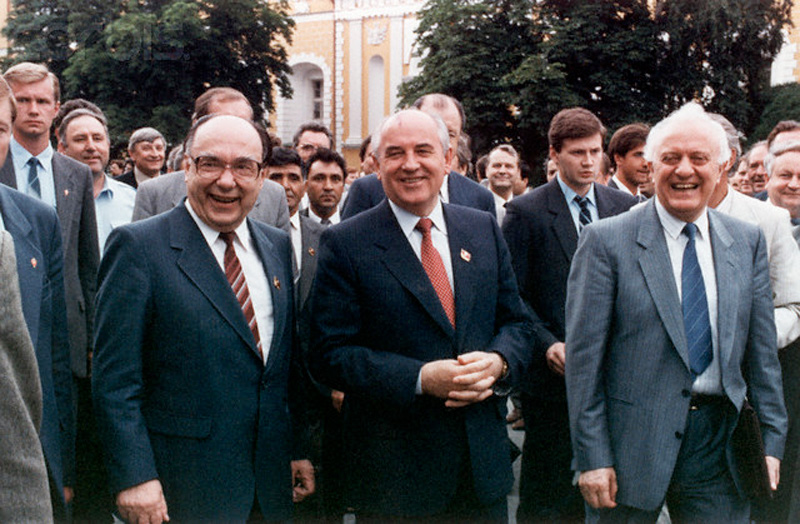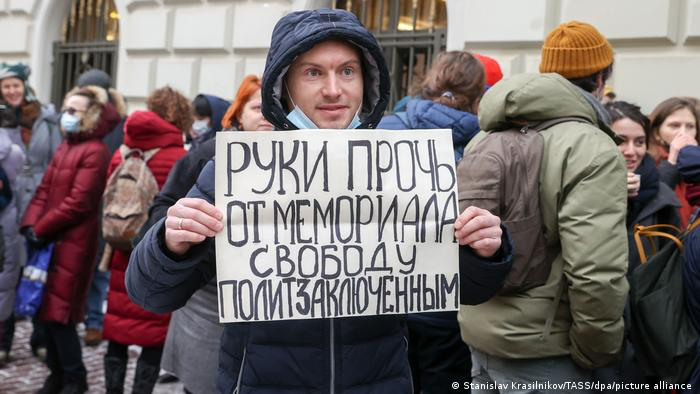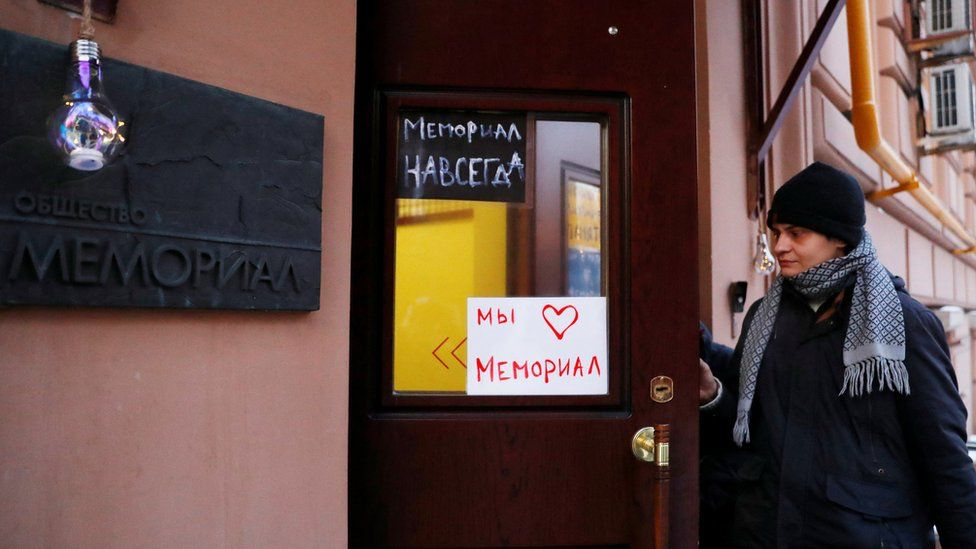For anyone caring about ending mass violence, memorialization, reparations, and the role of civil society in democratization, the closing down of Russia’s Memorial International and its sister organization the Memorial Human Rights Center by the Russian Supreme Court in late December 2021 is cause for mourning. These are concerns, which the University of Minnesota’s Holocaust and Genocide Studies Center has promoted unstintingly.
Since 1989, the two Russian NGOs have accumulated impressive archives documenting human rights abuses during the Soviet era, advocated for reparations to survivors, and defended human right svictims in conflict zones, in and around modern Russia, as well as the rights of minorities such as LGBTQ Russians.[1] Having played a major part in the ongoing efforts to democratize Russia, they have vowed to fight the closing down of their activities in court and to pursue their work. So far, their homepages are being updated regularly and accept gifts from overseas.[2] The US media covered the news; and petitions of protest are circulating.[3] But rumors of a pending Russian invasion of Ukraine soon distracted minds.[4]

The years of reform, glasnost and presetroika: Alexander Yakovlev, Mikhail Gorbachev, Eduard Shevardnadze walking in the Kremlin, 1989 (personal archive of Anatoly Chernyaev)
National Security Archive: The George Washington University
As talk of war between Ukraine and Russia reach a higher pitch, and NATO and the US exchange threats with the Putin regime, it seems counterintuitive to recommend more contact between Russian and Western civil societies rather than less. And yet, history and memory should guide us. Here are two examples.
In the post-Stalin years from 1955 to the early 1990s, Soviet, American and European scientists collaborated to propose actionable plans on arm control and nuclear disarmament, which made a difference to the senior leaders’ negotiations at the height of the Cold War.[5] Meanwhile Fulbright exchanges of US, Soviet and Russian scholars and students have continued for over 60 years. Although it is impossible to assess the program’s causal impact quantitively, one of the first Soviet Fulbright scholars was Aleksandr Yakovlev who spent a year at Columbia University in 1959, and attended George Kennan’s lectures. Over time he changed from a young Stalinist into a promoter of democratization, and he became the closest adviser to the Soviet Union’s reforming Secretary-General Gorbachev’s on glasnost and perestroika in the 1980s. He devoted the last years of his life to the Rehabilitation Commission, which helped publish archives of the Soviet years of terror and extermination. By 2005, when Yakovlev died, 43 books had come out. “Clearing the names of tens of millions of Soviet citizens” had become his “volunteer” calling.[6]
When I addressed Russian scholars and activists at the 24th Bathhouse Readings of the New Literary Observer in the Moscow Memorial Center in 2016,[7] I suggested that the Russian and Soviet pasts should be revisited not only to repent and repair, but also to remember a tradition of non-violent and collective self-transformation, which unfolded in the Soviet Union by fits and starts during the Kruschev-initiated Thaw (1956-1964) and the years of perestroika and glasnost (1985-1991). My audience was skeptical. Paradoxically Russian liberals and opponents of the Putin regime have forgotten these accomplishments just when Putin is working on a restoration of the cult of the Russian empire and Stalin. It is true that political, economic and judicial institutions and an effective state have failed to develop in Russia, at the cost of much suffering. This explains also why President Putin has remained in power for over 21 years: most Russians prioritize economic and political stability over human rights and civil freedoms.
Yet former US ambassador to Russia and Stanford professor Michael McFaul remembers experiencing a “euphoric moment” as a graduate student in 1991 in Moscow. The Russians “were victors as well in the Cold War and Ukrainians and Estonians and Georgians whom I knew at the time as well.”[8] Thousands of individual and collective acts facilitated the largely peaceful transition from a totalitarian regime to an emerging democracy, and Soviet Russian voters endorsed the almost-entirely non-violent disintegration of the vast Soviet empire, a first in world history, enthusiastically.[9]
It is, of course, much easier for external observers to be hopeful about the political future of Russia than for those who live under its authoritarian conditions. McFaul stresses agency beside structural factors. Even if Russians are shaped by historical legacies, cultural norms, and static institutions, “they are not trapped forever by them.” In the 1990s Russia was confronted with the unusual challenge of undergoing a triple transformation, from “empire to nation-state, dictatorship to democracy, and command economy to capitalism.” Political science cannot predict, but McFaul thinks it more unlikely that Putinism will survive another two decades than for a new system, possibly a democratic one, to emerge.[10] Maria Zavialova, the Russian-born and trained curator of the Museum of Russian Art in Minneapolis-Saint Paul notes that, although the Russian system has become more repressive, “society is full of a lot of free-thinking people.”[11]


BBC, January 2, 2022
Since the 1970s, the Twin-Cities area has attracted some 50,000 people of Russian origin, half of them Jewish. The community has its media, a charter school, churches, synagogue and grocery stores. Like many other immigrants, Russian-speaking Twin Cities residents keep many connections with their home countries while observing public reserve on the US-Russian state relationships.
Sound information, however, is different from partisanship. Twin Cities businessman Todd Lefko, who is married to a Russian citizen, has chaired since 2019 the Russian-American Business & Culture Council (RABCC), which offers programs on Russian culture, but also current events, including “What’s really up between Russia and Ukraine?” in December 2021 with the participation of US, Russian and Ukrainian scholars.[12]
At the University of Minnesota, the Center for German and European Studies is sponsoring with the support of the German Academic Exchange Service (DAAD) a research seminar in fall 2022 with senior scholars from Russia, the UK and the US, which is entitled: “Civil society in Germany, EU, and Russia and the ‘new Cold War:’ Learning from History; Planning for the Future”. A publication will follow. The scholars will examine how to think through the many manifestations of Russian civil society for democratization beside the Navalny movement, and its historical and sociological roots; and they will discuss whether Germany and the European Union should do more to support Russian civil society actors who work for democratization. They will also discuss what Western pro-democracy activists can learn from Russian civil society actors who have worked under duress for a long time, at a time when Radical-Right populism and authoritarian tendencies are growing in the European Union member states and the US. One wishes this last question would not be so relevant today.
Catherine Guisan is an independent scholar and Visiting Associate Professor affiliated with the Department of Political Science, University of Minnesota, Minneapolis. Her research interests include European politics, politics of reconciliation, social movements for democratization, political theory. To read more of her work see: Un sens à l’Europe: Gagner la Paix (1950-2003), A Political Theory of Identity in European Integration: Memory and Policies, “Of Political Resurrection and ‘Lost Treasures’ in Soviet and Russian Politics.”
[1] https://en.wikipedia.org/wiki/Memorial_(society)
[2] https://www.memo.ru/en-us/memorial/departments/intermemorial/news/667
[3] https://www.change.org/p/hands-off-memorial
[4] For an excellent op-ed article comparing memory in Russia and the US, see John Rash, “Echoes of Stalinist past as Russia silences its top human rights group,” Star Tribune, Saturday January 15, 2022.
[5] Matthew Evangelista, Unarmed Forces: The Transnational Movement to End the Cold War, Ithaca and London: Cornell University Press, 1999.
[6] Masha Gessen, The Future is History: How Totalitarianism Reclaimed Russia, London: Granta, 2017, 143-149, 250.
[7] The US State Department’s Speaker’s bureau sponsored my lectures in five Russian academic institutions, April 2016.
[8] https://www.cbsnews.com/news/putins-russia-today-former-ambassador-michael-mcfaul-intelligence-matters/ (downloaded January 12, 2021).
[9] For more on this, see Catherine Guisan, “Of Political Resurrection and ‘Lost Treasures’ in Soviet and Russian Politics”, Europe-Asia Studies, 2018, 10 (9), 1381-1406.
[10] Michael McFaul, “Russia’s Road to Autocracy”, Journal of Democracy, October 2021, https://www.journalofdemocracy.org/articles/russias-road-to-autocracy/ (downloaded January 15, 2022.
[11] Cited in John Rash, ibid. See also https://tmora.org/.
[12] https://rabcc.org/online-event-archive/2021/12/6/what-is-really-up-between-russia-and-ukraine (downloaded January 19, 2021).

Comments